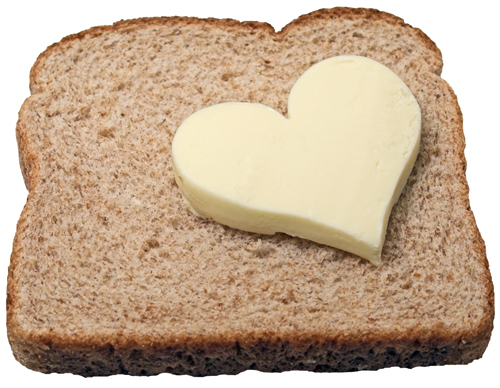(单词翻译:单击)
听力文本
Now the VOA Learning English program Words and Their Stories.
Today we talk about a food expression using something most cultures have – bread. It could be naan bread of India, a pita from the Middle East or steamed bread from China. The French have the baguette and Italians have ciabatta. Scandinavian countries often eat heavy, dark breads. And people throughout South America may eat deep fried breads.
Some people like to dip their bread into olive oil. Some like to spread chocolate on top. But one of the best things to put on bread -- especially if it is warm from the oven -- is butter!
Bread and butter is a classic combination.
But "bread and butter" also means something almost as comforting: a way to make money!
Some word experts say the phrase "bread and butter" began in Europe and England during the Middle Ages. At that time, many peasants could only afford bread and butter as their entire meal. Or they would eat it with soup.
So, bread and butter was a food staple. And that is what the expression "bread and butter" meant for many years – a basic item for life. After you got your bread and butter, you could then purchase more items for your household.
Then around the 1600s, the meaning changed. People began using it to mean the way they earned a living, or their livelihood.
So, that is the origin. Here is how you can use it.
Let's say you really like to write and perform songs. But you do not make enough money doing those things to pay for your housing, groceries and other expenses. So you get a job as a website designer. If someone asks what you do, you could say, "Well, I'm a musician. But designing websites is my bread-and-butter."
In other words, designing websites pays your bills. Making music ... does not. So, you count on web design for your "bread and butter."
For some people, it is important to have a stable bread-and-butter job. They get nervous if they do not have a steady paycheck coming in. Being a doctor is a good bread-and-butter job. If you are an import-export specialist, you could say business and trade are your bread and butter.
Now, if you really like your job and it pays well, you probably want to keep it. And if you work for someone else, you probably want to keep them happy. In other words, you should know which side your bread is buttered on.

"To know which side your bread is buttered on" means you are aware of the people who can help you. But this expression has a bad feel to it. It means being unusually aware of how others can help you.
Now, let's hear two friends use some of these expressions in a short conversation.
Hey, do you want to go to the football game this afternoon?
I can't. I have to help my girlfriend's dad paint his garage. He may be able to help me get a job at his software company.
I see. Well, it's always good to know which side your bread is buttered on.
Do you have to make it sound that way?
Which way is that?
Like I'm scheming or plotting or something like that.
I'm just saying you're being smart. If he can help you, it's a good idea to help him.
Look. Designing software is my bread-and-butter. And don't forget – I'm the breadwinner for my mom and two brothers. So, I'm lucky to know someone who is so connected in the business.
Well, just make sure you stay on his daughter's good side too. If you guys break up, you might find yourself on the breadline.
Urgh. Let's change the subject!
And that's all the time we have for Words and Their Stories. I hope you have enjoyed learning about these bread expressions. The story editor, Kelly Jean Kelly, liked it. She said it was the best thing since sliced bread! When bakers started slicing bread it made it easier to eat. So, when something is very good we can say it is the best thing since sliced bread. This was a very nice thing for Kelly to say even if it was a great exaggeration!
Until next time, I'm Anna Matteo!
重点解析
1.pay for 付钱;支付
Using plastic to pay for an order is simplicity itself.
用信用卡支付订单是很简单的事。
2.count on 依靠;依赖
Few people can count on having a job for life.
几乎没有人能指望一辈子都干一个工作。
3.in other words 换言之;也就是说
They asked him to leave ─ in other words he was fired.
他们请他走人,也就是说,他被解雇了。
参考译文
欢迎收听VOA慢速英语《词汇掌故》。
今天我们谈论一种有关食物的表达方式,大多数文化中都有它——面包。它可以是印度烤饼,中东的皮塔饼,或是中国的馒头。法国人吃长棍面包,意大利人吃夏巴塔面包。斯堪的纳维亚国家的人经常吃很沉的深色面包,而整个南美洲的人都会吃油炸面包。
有些人喜欢用橄榄油蘸面包,有些人喜欢在上面涂巧克力。但在面包上抹的最好的一种东西是黄油,尤其是在烤箱里烤得很热的时候!
面包和黄油是一种经典的组合。
但“面包和黄油”也意味着一些几乎同样令人安慰的东西:赚钱的方式!
一些词汇专家说,“面包和黄油”这个短语起源于中世纪的欧洲和英国。当时,许多农民只能买得起面包和黄油作为一顿饭,或者他们会把它和汤一起吃。
所以,面包和黄油是主食。这就是“面包和黄油”这个词多年来的含义,即一种基本生活用品。拿到面包和黄油后,你就可以为家人购买更多的东西了。
后来在16世纪前后,这个短语的意思发生了变化。人们开始用它来表示谋生的方式,或他们的生计。
这就是它的起源,下面是如何用它。
假设你真的喜欢写歌和表演,但是你做这些事情赚的钱不够支付住房、买杂货和其他费用。所以,你找到一份网站设计师的工作。如果有人问你做什么,你可以说,“嗯,我是个音乐家,但设计网站是我的谋生之道。”
换言之,设计网站为你支付账单,而制作音......则不行。所以,你指望网页设计作为“主要的收入来源。”
对某些人来说,有一份稳定的工作很重要。如果没有稳定的薪水,他们就会紧张。当医生是份好工作。如果你是一个进出口专家,你可以说商业和贸易是你主要的收入来源。
现在,如果你真的很喜欢自己的工作而且薪水不错,你可能就想要保住它。如果你是给别人打工,你可能想让他们开心。换句话说,您应该知道which side your bread is buttered on。
“To know which side your bread is buttered on”意思是你知道什么是对自己最有利的事。但是这个表达有一种不好的感觉,它意味着要特别注意别人如何帮助你。
现在,我们来听下两个朋友在简短的对话中使用这些表达。
嘿,你今天下午想去看足球赛吗?
不行,我得帮我女友的爸爸漆车库。他也许能帮我在他的软件公司找到一份工作。
知道了,嗯,能清楚什么对自己最有利总是件好事。
你一定要这样说吗?
哪样说?
好像我在策划什么似的。
我只是说你很聪明。如果他能帮助你,帮助他是个好主意。
你看,设计软件是我的主要的收入来源。别忘了,我是要养家糊口的人,我有母亲和两个兄弟。所以,我很幸运认识一个在这个行业中人脉很广的人。
好吧,你也要站在他女儿这边。如果你们分手的话,你可能会发现自己生活清贫。
呃,我们换个话题吧!
今天的节目就到这里了,我希望你喜欢学习这些有关面包的表达方式。故事编辑凯利·吉恩·凯利很喜欢。她说这是有切片面包以来最好的事!面包师切面包后,吃面包就更方便了。所以,当某样东西非常好时,我们可以说it is the best thing since sliced bread(这是有史以来最好的事情)。对凯利来说,这很棒,即使它夸大其词了!
下期节目见,我是安娜·马特奥!


